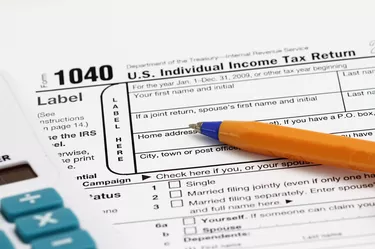
Simplifying tax chores with the short forms 1040-EX or 1040-A is appealing so long as it doesn't cost you a lot in extra taxes. Short forms differ from the long form in two important ways. First, not everyone can use a short form. Second, the tax breaks you can claim on short forms are limited.
Short Form Tax Returns
Video of the Day
You can use the 1040-EZ form if you file as single or married filing jointly and with no dependents. Total income for you and a spouse must be under $100,000 with less than $1,500 in interest income. Don't use 1040-EZ if you have to report self-employment income or capital gains or losses. You cannot use 1040-EZ to itemize deductions. You cannot claim exemptions for being over age 65 or blind. The only tax credit you can claim is the Earned Income Credit if you didn't receive advance credit on your paycheck. If you have dependents or qualify for age or blindness exemptions, use Form 1040-A. Most of the other restrictions on the 1040-EZ also apply to 1040-A. You can deduct amounts like IRA contributions and student loan interest. You can claim some tax credits in addition to the EIC, including the Child Tax Credit and Child Care Credit.
Video of the Day
1040 Long Form
The advantage of the 1040 is you do have spaces to claim every tax credit and deduction you are entitled to. For instance, you can write off state sales taxes, charitable contributions and qualified medical expenses. You must complete Schedule A to itemize deductions and probably other forms as well.